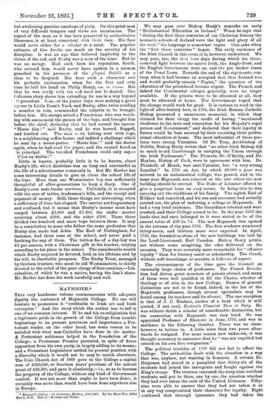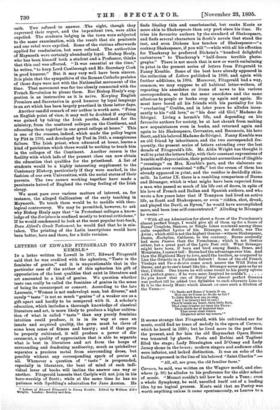MAYNOOTH.*
Tao very handsome volume commemorates with adequate dignity the centenary of Maynooth College. No one will hesitate to pronounce it "creditable to Irish art and Irish enterprise." And the story which the author has to tell is one of no common interest. If he and his co-religionists feel a legitimate pride in the growth of the College from humble beginnings to its present greatness and importance, a Pro- testant reader, on the other hand, has some reason to be satisfied with what non-Catholics have done in the matter. A. Protestant nobleman helped in the foundation of the College; a Protestant Premier persisted, in spite of fierce opposition from his own party, in largely adding to its means; and a Protestant Legislature settled its present position with a liberality which it would not be easy to match elsewhere. The Irish Church Act of 1869 gave to the College a capital sum of 2369,040, or fourteen years' purchase of the annual grant of 226,360, and gave it absolutely,—i.e., so as to become the property of the College, without any kind of Government control. It was not more than ought to have been done ; it certainly was more than would have been done anywhere else in Europe.
• 'forsooth College : its emissary History, 1795-1895. By the Most Res.. John Hea'y. D.D. Dubin: Blown° and Nolan.
We may pass over Bishop Healy's remarks on early "Ecclesiastical Education in Ireland." When he says that "during the first three centuries of our Christian history the monastic schools of Ireland were the light and glory of all the west," his language is somewhat vague. One asks when the "first three centuries" began. The early eminence of the Irish Church in this reaps at is, however, undoubted. We may pass, too, the troll ions days during which the three- cornered fight between the native Irish, the Anglo-Irish, and the English Government went on, and the yet darker times of the Penal Laws. Towards the end of the eighteenth cen- tury, when it had become an accepted fact that Ireland was and would probably remain "Papist," the question of the education of the priesthood became urgent. The French, and indeed the Continental colleges generally, were no longer available. If the priests were to be educated at all, they must be educated at home. The Government hoped that the change would work for good. It is curious to read in the light of after-history how, in 1794, the Irish Roman Catholic Bishop presented a unanimous memorial, in which they claimed for their clergy the credit of having "inculcated obedience to the laws and veneration for his Majesty's royal person and Government," and declared that their loyalty in future would be best seamed by their receiving their profes- sional education at home. The most influential of these pre- lates were strong Unionists. Of Dr. Troy, Archbishop of Dublin, Bishop Healy writes that "no other Irish Bishop did so much to aid Castlereagh in carrying the Union through the Irish Parliament." The Primate, Dr. O'Reilly, and Dr. Moylan, Bishop of Cork, were in agreement with him. Dr. Plunkett, of Meath, was anti-Unionist, but "a very strong Loyalist." In 1795 an Act, by which 28,000 a year was secured to an ecclesiastical college, was passed, and in the same year Maynooth was selected as the site where the new building should be erected. The Duke of Leinster offered to give a perpetual lease on easy terms. In doing this be was carrying out the traditions of his family. The eighth Earl of Kildare had conceived, and his son and successor had actually carried out, the plan of endowing a college at Maynooth. It had a very brief existence. The Geraldines rebelled and were crushed, and their College ceased to be. In the year 1553 the lands that had once belonged to it were stated to be of the annual value of £38 2s. 7d. The new Maynooth was opened in the autumn of the year 1795. The first students numbered thirty-seven, and thirteen more were expected. In April, 1796, the foundation-stone of the new buildings was laid by the Lord-Lieutenant, Earl Camden. Bishop Healy prints, not without some misgiving, the odes delivered on the occasion. They were certainly more remarkable for "effusive loyalty" than for literary merit or scholarship. The Greek, without soft breathings or accents, is hideous of aspect.
The circumstances of the time gave the Council an unusually large choice of professors. The French Revolu- tion had driven great numbers of priests abroad, and many of them were well qualified to fill the Chairs, whether of theology or of arts, in the new College. Names of general distinction are not to be found, indeed, in the list of the Maynooth professors, though several specialists may be found among its teachers and its alumni. The one exception is that of J. C. Eustace, author of a book which is still quoted, if not read, Eustace's Classical Tour in Italy. He was without doubt a scholar of considerable distinction, but his connection with Maynooth was very brief. He was appointed Professor of Rhetoric in June, 1795, and was in residence in the following October. There was no class, however, to lecture to. A little more than two years after- wards he resigned. For some reason now unknown, it was thought necessary to announce that he "was not expelled but retired on his own free resignation."
The political troubles of 1798 did not fail to affect the College. The authorities dealt with the situation in a way that was, anyhow, not wanting in firmness. A certain Dr. Duigenan had stated in a pamphlet that thirty-six of the students had joined the insurgents and fought against the King's troops. The trustees convened the sixty-nine resident students and put to them, one by one, the question whether they had ever taken the oath of the United Irishmen. Fifty- nine were able to answer that they had not taken it or in any way compromised their character for loyalty. Eight confessed that through ignorance they had taken the
oath. Two refused to answer. The eight, though they expressed their regret, and the impenitent two, were alike expelled. The students lodging in the town were subjected to the same examination, with the result that six penitents and one rebel were expelled. Some of the victims afterwards applied for readmission, but were refused. The authorities of Maynooth were certainly abundantly loyal. Bishop Healy, who has been himself both a student and a Professor, thinks that this zeal was affected. "It was essential at the time," he writes, "to keep Lord Castlereagh and Mr. Secretary Cook in good humour." But it may very well have been sincere. It is plain that the sympathies of the Roman Catholic prelates of those days were not with the Nationalist movement of the time. That movement was far too closely connected with the French Revolution to please them. But Bishop Healy's sug- gestion is as instructive as it is naive. Keeping English Premiers and Secretaries in good humour by loyal language is an art which has been largely practised in these latter days.
Another candid remark of our author is worth note. "From an English point of view, it may well be doubted if anything was gained by taking the Irish youths, destined for the ministry, from the scattered colleges on the Continent, and educating them together in one great college at home." This is one of the reasons, indeed, which made the policy begun by Pitt in 1795, and developed by Peel in 1845, a conspicuous failure. The Irish priest, when educated at home, learns a kind of patriotism which there would be nothing to teach him in the colleges of the Continent. Another reason is the facility with which lads of the peasant class can now obtain the education that qualifies for the priesthood. A list of students would be a highly interesting supplement to the Centenary History, particularly if they were marked, in the fashion of our own Universities, with the social status of their parents. The two causes working together have made a passionate hatred of England the ruling feeling of the Irish clergy.
We must pass over various matters of interest, as, for instance, the alleged Gallicanism of the early teaching in Maynooth. To touch them would be to meddle with theo- logical controversy. We may be permitted, however, to ask why Bishop Healy says that "in Protestant colleges a know-
ledge of the Scripture is confined mostly to textual criticisms." If he would condescend to look at the most popular text-book, Dean Alfcrrd's Greek Testament, he would find that he is mis- taken. The printing of the Latin inscriptions would have been better, here and there, for a little revision.











































 Previous page
Previous page